- Aug 02, 2023
- Talent Management
- 3775
Share this post on:
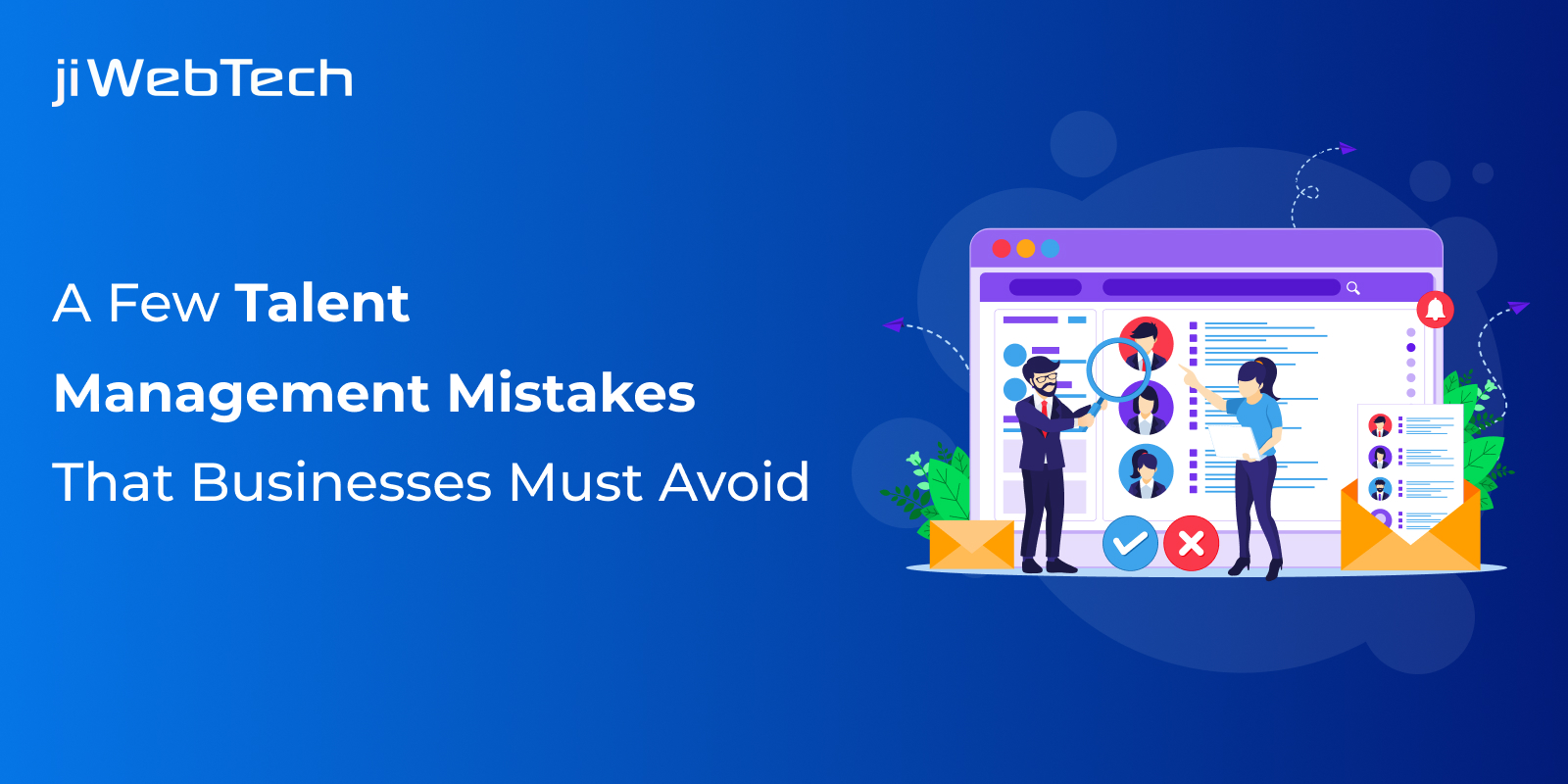
Talent management is one of the most crucial and difficult parts of any organization. This deals with attracting, developing, and retaining skilled employees who can contribute to the success of an organization. Talent management is a blend of various processes such as recruitment, onboarding, training and development, and performance management. It directly impacts the organization's ability to achieve its goals and maintain a competitive advantage in the market.
Why is talent management a critical component of any successful organization?
In today's competitive technical world, having a robust talent management strategy is crucial for companies to stay ahead of their competition.
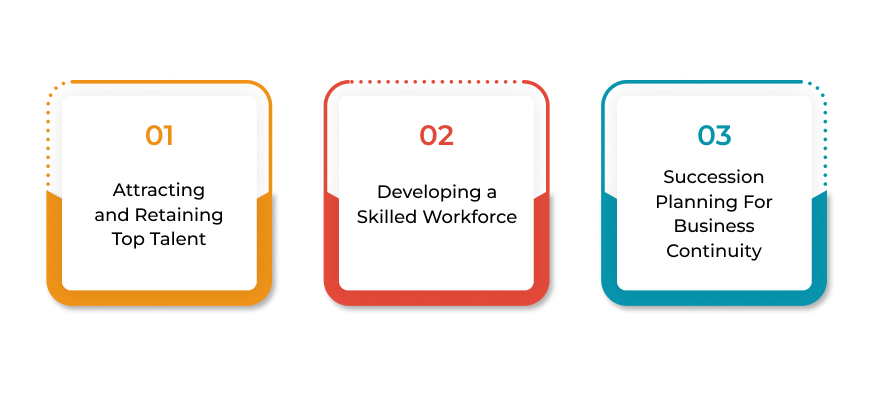
Attracting and Retaining Top Talent: Today, organizations must differentiate themselves to attract skilled individuals who can drive innovation and growth. Effective talent management practices help businesses create an employer brand that appeals to high-performing candidates.
Organizations can identify and attract individuals with the right skills, experience, and cultural fit by implementing robust recruitment strategies. This ensures that the company has a pool of talented employees who can contribute to its success. Moreover, talent management also focuses on employee retention by providing opportunities for career growth, recognition, and work-life balance. Retaining top talent reduces turnover costs and maintains continuity within the organization.
Developing a Skilled Workforce: Another critical aspect of talent management is developing a skilled workforce. Businesses must invest in training and development programs to enhance the capabilities of their employees. Moreover, organizations can ensure that their workforce remains up-to-date with industry trends and possesses the necessary skills to perform their roles effectively by providing ongoing learning opportunities.
Training programs can be tailored to address specific skill gaps within the organization or to develop leadership capabilities among high-potential employees. Businesses not only improve individual performance but also foster a culture of continuous learning and growth by investing in employee development. This leads to increased employee engagement, productivity, and overall organizational performance.
Succession Planning for Business Continuity: Succession planning is a critical component of talent management that ensures business continuity. It involves identifying and developing potential successors for key leadership positions within the organization. Businesses can mitigate the risks associated with unexpected departures or retirements of key personnel by proactively planning for future leadership needs.
Succession planning allows organizations to groom internal talent and provide them with the necessary skills and experiences to take on leadership roles. This reduces the reliance on external hires and ensures a smooth transition of responsibilities. Effective succession planning also helps maintain organizational knowledge and expertise, preventing any disruption in operations.
Must-Avoid Talent Management Mistakes
Even though Talent Management is vital for the success of any business. However, many businesses make common mistakes in their talent management strategies, which can hinder their ability to build a high-performing workforce.
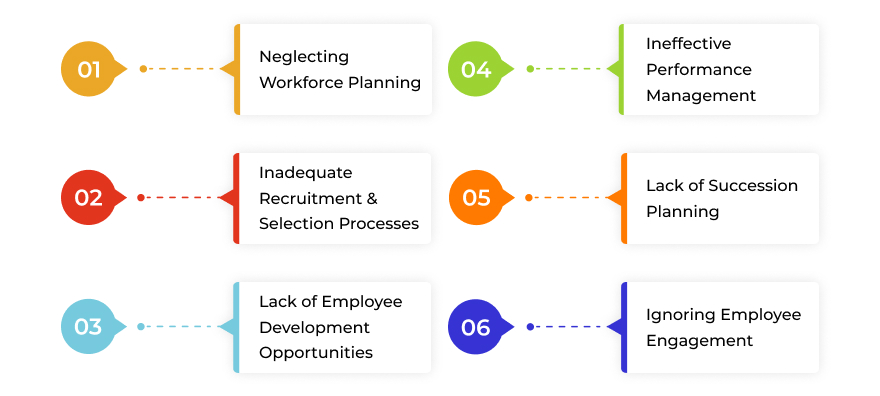
Neglecting Workforce Planning: One of the most significant talent management mistakes is neglecting workforce planning. Without a clear understanding of the organization's current and future talent needs, businesses may struggle to identify and acquire the right talent. This can lead to skill gaps, increased turnover rates, and decreased productivity. To avoid this mistake, businesses should invest time and resources in strategic workforce planning. This involves analyzing the organization's goals, identifying the skills and competencies required to achieve those goals, and assessing the current workforce against those requirements. By conducting regular workforce planning exercises, businesses can proactively address talent gaps and develop effective recruitment and development strategies.
Inadequate Recruitment and Selection Processes: Another common mistake in talent management is having insufficient recruitment and selection processes. Hiring the wrong individuals can have bad effects on team dynamics, productivity, and overall organizational performance.
So, businesses should establish robust recruitment and selection processes. This includes clearly defining job requirements, conducting thorough candidate assessments (including interviews, tests, and reference checks), and involving multiple stakeholders in the decision-making process.
Lack of Employee Development Opportunities: Failing to provide sufficient employee development opportunities is another critical talent management mistake. Employees who feel undervalued are more likely to seek opportunities elsewhere, leading to increased turnover rates and loss of valuable talent.
Hence, businesses should prioritize employee development and create a culture of continuous learning. This can be achieved through various initiatives such as training programs, mentorship opportunities, job rotations, and career development plans. By investing in their employees' growth and providing them with opportunities to enhance their skills and knowledge, businesses can foster loyalty and retain top talent.
Ineffective Performance Management: Ineffective performance management is another common talent management mistake that can hinder employee engagement and productivity. Businesses should adopt a more agile and continuous performance management approach. This involves setting clear performance expectations, providing regular feedback and coaching, and recognizing and rewarding high performers. Implementing technology-enabled performance management systems can also streamline the process and facilitate ongoing communication between managers and employees.
Lack of Succession Planning: Failure to implement succession planning is a significant talent management mistake that can leave organizations vulnerable to leadership gaps during periods of transition or unexpected departures. Without a pipeline of qualified internal candidates, businesses may struggle to fill critical roles effectively.
Hence, businesses should develop a robust succession planning strategy. This includes identifying key positions within the organization and implementing development plans to groom individuals for future leadership roles. Businesses can ensure continuity and minimize disruptions, by proactively preparing for leadership transitions.
Ignoring Employee Engagement: Employee engagement is crucial for attracting, retaining, and motivating top talent. However, many businesses make the mistake of ignoring or undervaluing employee engagement initiatives. Organizations should prioritize employee engagement by fostering a positive work environment, promoting open communication channels, recognizing achievements, and involving employees in decision-making processes. Regular employee surveys can also provide valuable insights into areas for improvement and help measure engagement levels.
Effective Strategies For Effective Talent Management
Implementing the right talent management solution can have a significant impact on an organization's bottom line. It can lead to increased productivity, improved employee satisfaction and retention rates, enhanced innovation and creativity, and better business outcomes. To help organizations optimize their talent management efforts, here are some of the best strategies to consider:
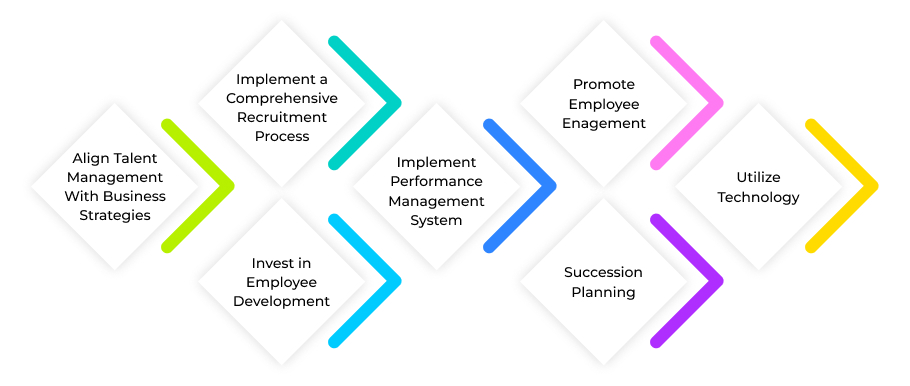
Align Talent Management With Business Strategies: The first step in developing an effective talent management solution is aligning it with the organization's overall business strategy. This involves understanding the company's goals and objectives and identifying the key competencies and skills required to achieve them. Organizations can ensure that they are investing in the right people and capabilities to drive success by aligning talent management initiatives with business strategy,
Implement a Comprehensive Recruitment Process: A strong recruitment process is essential for attracting top talent. Organizations should leverage various sourcing channels such as job boards, social media platforms, professional networks, and employee referrals to reach a diverse pool of candidates. Additionally, implementing rigorous screening and selection processes can help identify candidates who possess the necessary skills and cultural fit.
Invest in Employee Development: Developing employees' skills and competencies is crucial for their growth and engagement within the organization. Organizations should provide ongoing learning and development opportunities to help employees acquire new skills, enhance their existing ones, and stay up-to-date with industry trends. Investing in employee development can help organizations enhance their talent pool and increase employee loyalty and satisfaction.
Implement Performance Management Systems: Performance management systems play a vital role in talent management by providing a structured approach to setting goals, monitoring progress, providing feedback, and evaluating performance. Organizations should establish clear performance expectations and provide regular feedback to help employees improve their performance. Additionally, implementing a fair and transparent performance appraisal process can help identify high performers and provide them with appropriate recognition and rewards.
Promote Employee Engagement: Engaged employees are more likely to be productive, innovative, and committed to the organization's success. Organizations should focus on creating a positive work environment that fosters employee engagement. This can be achieved by promoting open communication, encouraging collaboration and teamwork, recognizing and rewarding achievements, providing opportunities for career growth, and ensuring work-life balance.
Succession Planning: Succession planning is crucial for ensuring the long-term sustainability of an organization. It involves identifying high-potential employees and developing them for future leadership roles. Organizations should have a structured succession planning process in place that includes identifying key positions, assessing potential successors, providing targeted development opportunities, and regularly reviewing progress.
Utilize Technology: Technology plays a significant role in modern talent management solutions. Organizations should leverage HR software systems that automate various talent management processes such as recruitment, performance management, learning management, and succession planning. These systems can streamline administrative tasks, improve data accuracy and accessibility, facilitate collaboration between HR professionals and managers, and provide valuable insights for decision-making.
How To Choose A Talent Management Company?
With so many Talent Management Companies available in the market, choosing the right one can be a hectic task. In this article, we will discuss some key factors to consider when selecting a talent management company.
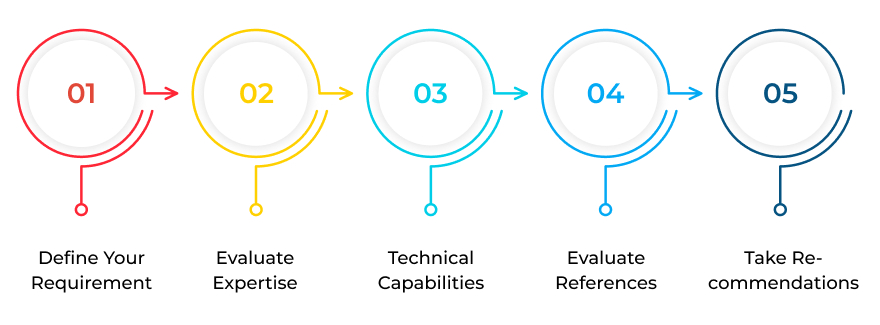
Define Your Requirements: Take the time to assess your current talent management practices and know where improvements are needed. Determine what services you are looking for from a talent management company, such as recruitment, performance management, leadership development, or succession planning.
Evaluate Expertise: It is crucial to evaluate the expertise and experience of the service providers in the field. Hence, find the companies that have a proven track record of success in helping organizations achieve their talent management goals. Consider factors such as the number of years the company has been in operation, the industries they have worked with, and the size of organizations they have served.
Technical Capabilities: Today, technology plays a significant role in talent management processes. When selecting a talent management company, it is important to assess its technology capabilities. So, look for providers that offer robust and user-friendly software solutions that can streamline your talent management processes.
Evaluate References: Reputation is another critical factor to consider when selecting a talent management company. Research the company's reputation by reading online reviews, testimonials, and case studies. Moreover, ask the company for references from past or current clients who can provide insights into their experience working with the talent management company.
Take Recommendations: Seeking recommendations from trusted sources can be a valuable way to find a reputable talent management company. Reach out to industry peers, professional networks, or HR associations for recommendations based on their experiences. These recommendations can provide valuable insights and help you narrow down your options.
Conclusion:
In conclusion, talent management is a critical aspect of running a successful business. Companies can create a supportive environment conducive to employee growth and development by recognizing and addressing common issues. Remember to regularly evaluate and adjust your approach to talent management based on evolving business needs and employee feedback. With commitment and dedication to excellence, you can establish a thriving corporate culture focused on maximizing human capital assets. Contact jiWebTech to learn more.










